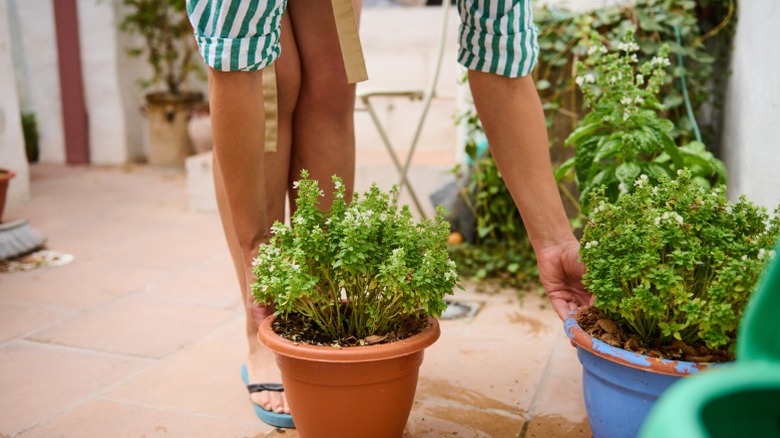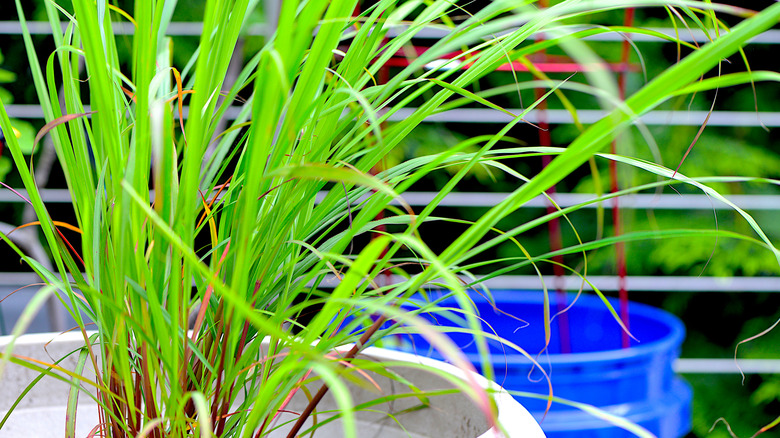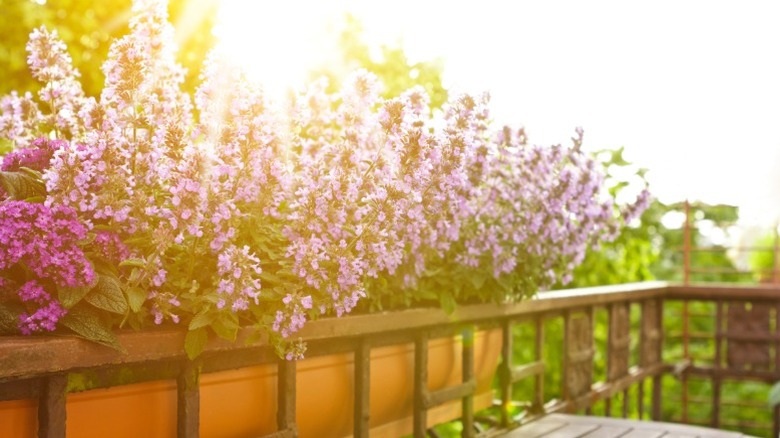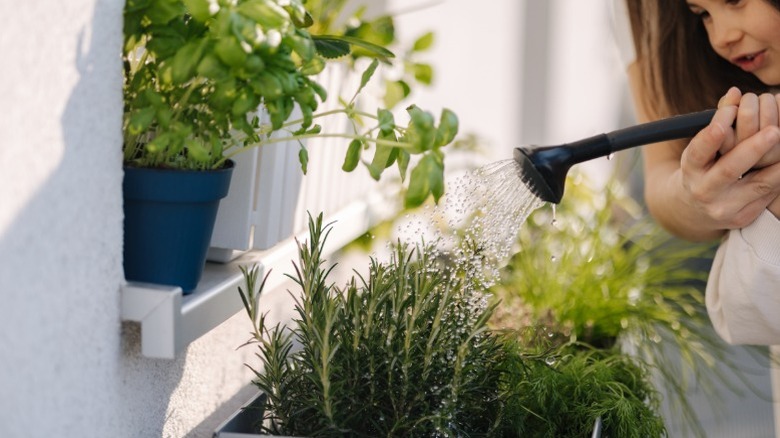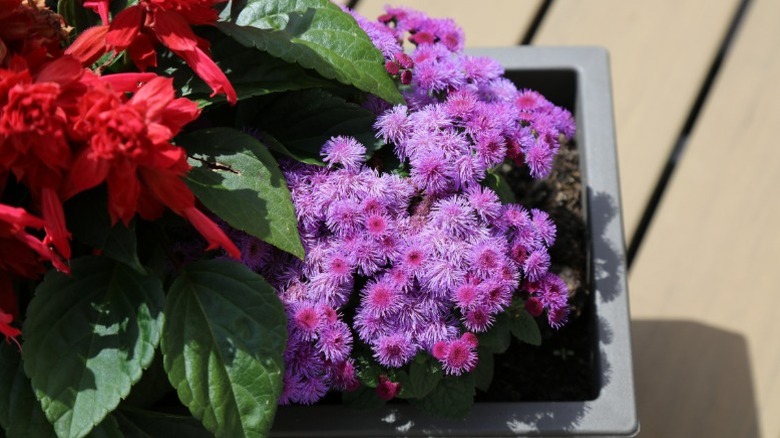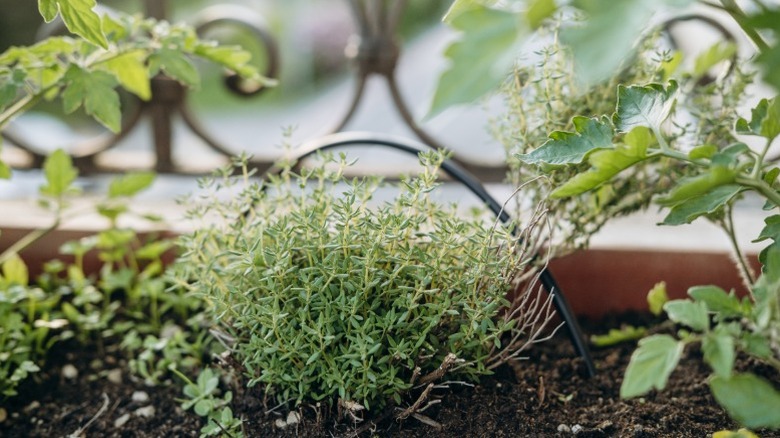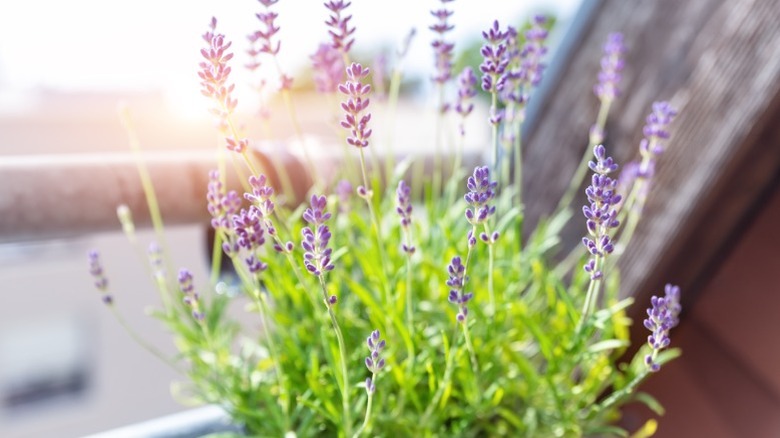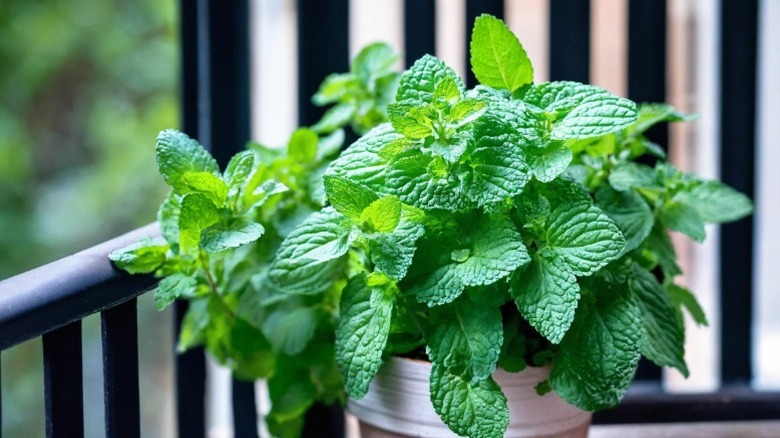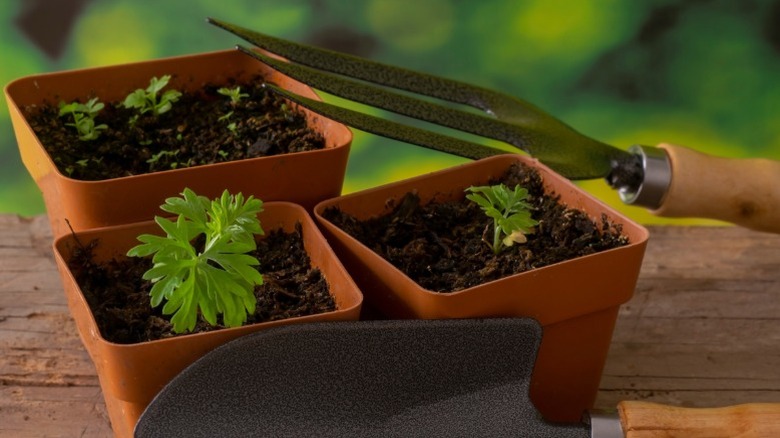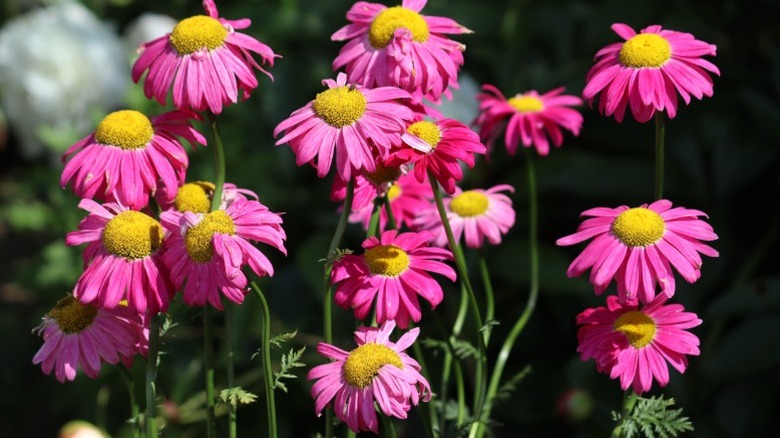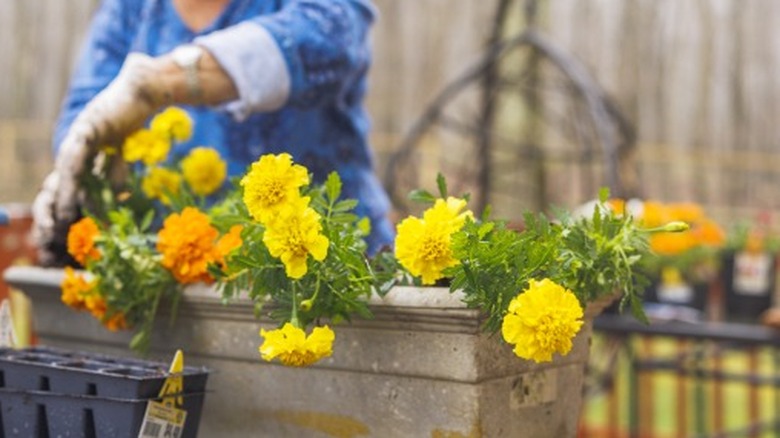12 Fast-Growing Plants You Should Add To Your Patio To Help Keep Bugs At Bay
It's hard to enjoy your patio space confidently when you and your guests are being besieged by insects. Even if you try to avoid the mistake too many people make that brings bugs to their yard by not leaving food outside, it can be difficult to handle mosquitoes, flies, and other creepy-crawlies. With the right plants, however, you have the ability to keep some of those bugs away so you can relax. Fast-growing plants like aromatic herbs (basil and rosemary) and pretty flowers (marigolds and floss flower) have smells and oils that some insects despise.
You don't necessarily need to rely on chemicals and sprays to make bugs stay away from your patio. Having some of these plants spread around your outdoor space can be an easy and natural way for insect repellent. However, remember that many of the compounds found in these plants that keep away bugs may not be strong in small quantities. Crushing the leaves and spreading the oil on your skin is the best way to make bugs leave you alone. But there is no detriment to having these fast-growing, beautiful plants around your patio area. Insect repellent plants on your patio can be a great component to a broader pest management plan.
Double the use of your homegrown basil
Basil (Ocimum basilicum) can be more than a delicious addition to pizza and salads. This aromatic herb can be used as a reliable repellent for bugs, including flies and mosquitoes. This herb is easily grown in pots and it can thrive in a patio environment, as long as temperatures are warm enough and it gets plenty of sun. Provided consistent moisture, basil will grow quickly from seed. Container-grown basil may need watering more often. If sown in warm soil after frost danger, seeds will germinate in 5 to 7 days.
Chase bugs away with the oils of lemongrass
The lemony fresh scent of lemongrass (Cymbopogon spp.), a popular tropical grass grown often for use in the kitchen, can also drive away bugs. However, the true deterrent is in the oil of the lemongrass plant, which has been found to be effective against mosquitoes and house flies in a 2013 study published in Parasite. Easy to grow in a container, lemongrass prefers full sun and rich soil, expanding quickly in hot, humid conditions. This herb is perennial in zones 8 through 11. Plant in large, 12 inch containers on your patio.
Contain catnip and drive away bugs at the same time
More than a treat for your cats, catnip (Nepeta cataria) has surprising insecticidal properties to keep bugs away. Cats living in the wild may even take advantage of this by rubbing against the plant. But you should grow catnip even if you don't have cats to stop bugs, like mosquitoes, cockroaches, and termites, before they come to pester you. Related to mint, it's best to be mindful when planting catnip because it grows very quickly and prolifically. It will do well in a large patio pot, although you might attract neighborhood cats.
Aromatic herbs like rosemary offer patios mosquito relief
Get rid of mosquitoes in your outdoor spaces by growing pots of rosemary. You can easily add rosemary to a simple herb container garden to fill your patio area with delightful scents. The tall, pretty foliage will add a little height to your outdoor greenery. Grow alongside lavender, which also thrives in drier soil conditions. This evergreen perennial is a good repellent against Japanese beetles, slugs, carrots flies, and snails thanks to its strong scent. Rosemary is hardy in zones 8 through 10, but can be overwintered indoors.
Grow the unique floss flower for its repellent properties
A quick-growing flower with fluffy heads, floss flower (Ageratum houstonianum) is a great choice to keep around your outdoor spaces. A 2022 study published in Scientific Reports highlighted the repellent effect of the extract of the floss flower against mosquitoes. Plant it in a container to take advantage of this fact, made possible by the coumarin chemical found in the species. This incredibly hardy annual can be grown in zones 2 through 11. These blue, purple, pink, or white flowers do well in full sun and require consistent but not too much moisture.
Drive away mosquitoes with lemon thyme
If you are not already growing this garden herb, consider the benefits of lemon thyme (Thymus citriodorus). This aromatic herb showcases great heat tolerance, thrives in the sun, and is hardy in zones 5 through 8. If allowed to flower, lemon thyme attracts good pollinators, but deters bugs like mosquitoes, cockroaches, and termites. Easy to establish, lemon thyme grows fairly fast and can be encouraged to come back year after year. Growing it in a container, where it can experience drier soil conditions, is ideal. Drought-like conditions help concentrate the bug-repelling oils.
Envelop your space with the protective fragrance of lavender
Combine beautiful fragrance, stunning flowers, and bug repellence with one plant – lavender (Lavandula angustifolia). Lavender is hardy in zones 5 through 8 and works well in a container with a well-draining soil mix. Your patio will be more welcoming and have fewer issues with pests, thanks to the oils in its leaves. There is some limited evidence that lavender is useful against mosquitoes, flies, and moths. You can easily start growing lavender in a planter in one season to help repel bugs on a patio.
Keep mint close at hand to beat back bugs
Mint, including hardy varieties like spearmint (Mentha spicata) and peppermint (Menta x piperita) are popular plants to grow to keep insects, like cabbage moths, ants, and fleas, away. The mint family is notorious for having trouble staying in their own garden bed, which makes container planting ideal. Contain your mint on a patio where its spreading roots cannot break through into the surrounding ground. Plus, mint may be effective at driving stray dogs or cats from your patio. Mint is hardy and will often come back year after year in zones 4 through 9.
Enjoy the repellent power of wormwood
Both types of wormwood, including common wormwood (Artemisia absinthium) and sweet wormwood (Artemisia annua), are rapid-growing herbs with lacy leaves and flowers popularly used in dried arrangements. Similar to other prolific herbs, wormwood reseeds quickly and readily. Planting it in a pot on a hard patio space will limit unwanted spread, considering its weedy tendencies. Common wormwood has been used for years to deter moths, fleas, and flies. Sweet wormwood has properties to keep mosquitoes and fire ants at bay. Keep away from pets as all parts of common wormwood are harmful to ingest.
Pennyroyal for problematic pests
) is a European native herb in the mint family that repels certain annoying pests like fleas. It also attracts beneficial parasitic wasps that control unwanted caterpillars and whiteflies. The weedy, quick-growing tendencies of pennyroyal make it a great candidate for a container garden on a patio away from wild areas. However, be aware that touching pennyroyal can lead to itching or rash in some individuals. It's not recommended to ingest the oil from the pennyroyal, but its lovely purple flowers arranged on stalks can be a useful addition to keep bugs away.
Painted daisies will repel pests on your deck
A perennial flower, painted daisies (Tanacetum coccineum) keeps some bugs away, such as fleas and lice. Thanks to different chemicals, including pyrethrin and jasmolin, painted daisies have long been considered great for pest control. Consider planting this daisy lookalike in all its beautiful shades in a container with well-drained soil. Popularly grown in herb gardens, this non-aggressive flower will go nicely alongside basil and rosemary for a pest-repellence. Painted daisies are hardy from zones 3 through 9 in the U.S. This species is easy to grow and maintain, reaching between 2 and 3 feet tall.
Cheerful marigolds add color and protect against insects
Make your patio planters extremely effective against pests with one of the best basil companion plants, a common, fast-growing flowering stunner. Marigolds (Tagetes) make a good pairing for many plants, plus they grow very well in containers, lending a bright look to your patio with their yellow, gold, or red blooms. Some scientific evidence exists that marigolds are a decent way to combat mosquitoes, thanks to the pyrethrum compound found in it. Growing marigolds from seed is not hard, with seeds germinating quickly, allowing you to start them about one month before transplanting outdoors.

